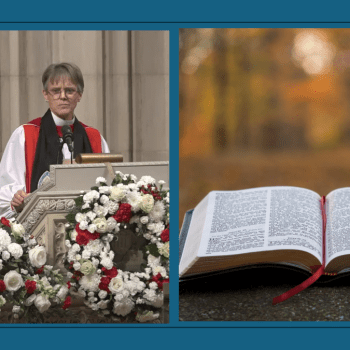The story of the Temptation of Jesus in Luke 4:1-15 equips us for resisting malignant power and tyranny.

His hair still dripping with drops of the baptismal promise, Jesus makes his way to the wilderness of testing. Where his toes had wriggled in the cool waters of the Jordan just a short time ago, his feet now crunch the dry, pebbled ground. He is alone. He has left John the Baptist and the crowds behind to find out who he truly is.
But Jesus is not really alone.
He feels a presence with him, like the little bird that fluttered around him as he emerged from the waters. And, of course, he knows who he is. That voice at the river was not just in his own head. Everyone heard it: “You are my Son, the Beloved; with you I am well pleased.”
But what does that mean, really?
Jesus needs to find out. So he follows the flitting little bird that leads him further and further from his home, deeper and deeper into the craggy landscape. Sleeping in caves in the heat of the day. Wandering and wondering in the cool mornings and evenings. Meditating and praying beneath the velvety, sparkling sky at night.
He has practiced fasting many times before, so he is familiar with the pangs of hunger. Every time his stomach grumbles, he pauses to pray and recite the scripture verses he knows so well.
The psalms are his companions. Torah is his faithful guide.
And always the little bird is just within sight, leading him to a stream when he is thirsty, into an outcrop of boulders when he needs protection. Until one morning he wakes up and the little bird is nowhere to be found. An eerie, silent stillness fills his chest.
Suddenly the hunger pangs come upon him with ferocious need. How long has it been since he’s eaten? A moon cycle? Longer? How long must he stay out here to prove to himself he is who he thinks he is, who the river voice told him to be?
“Why are you doing this to yourself? It would be so easy, so easy. If you are who you think you are, this is your moment!”
What is this voice? This is not the river voice. This is something else.
“Seize your power. Just touch this stone and imagine it as a steaming loaf of yeasty, crusty on the outside, warm on the inside, bread.”
No! Just because I can does not mean that I should. This is not the way. Torah is the way. “One does not live by bread alone.” But Jesus is so weak, he can’t even finish the sentence: “But by every word that comes from the mouth of God” (Deut. 8:3). He collapses in exhaustion.
Jesus wakes up again. He feels an icy wind stinging his face and hands. Yet he does not shiver. Is this a dream?
He rolls over onto his side and almost falls off the edge of a steep cliff. Scrambling back, his heart pounds in his chest. Where am I?
He sits up and sees that he is atop some kind of mountain. Below him he can see the vast expanse of human civilization stretching out in every direction.
He sees towns, cities, seaports, huge towers rising into the air. He watches tyrants rise into the air and smash fireballs into children’s beds. His anger roils. He must do something to help!
“You can. If you are who you think you are, why waste your power? Why let them suffer? You can do so much good . . . together with me! We can rule everything you see. We can bring peace to this writhing, seething madness of humanity. Proskuneses. Kneel before me. That river voice will bring you to your knees and you will suffer and die. But if you fall to your knees before me, I will give you life and strength and power. This is the way. Look around you. Your father doesn’t know what he’s doing. Or he doesn’t care. We know what’s best. We can take control, you and me. Proskuneses.”
No! Just because I can does not mean that I should. This is not the way. Torah is the way. It is written, “Worship the Lord your God, and serve God only.”
Suddenly his head spins with vertigo and bright sun blinds his eyes. Where is he? His hands grip carved stone. His body sways with a wave of nausea as he realizes where he is.
This is Jerusalem. There is the city gate. At the far edge is Gehenna, the trash dump.
How did he get up here to the top of the temple? Did he climb? Did he fly? How is this possible?
“Anything is possible for you, because you are the Son of God. Show them. Show them all who you are. This is your moment. Listen to Torah! You love God’s word! Torah teaches us, ‘God will command his angels concerning you to protect you.’ It is written: ‘On their hands they will bear you up lest you dash your foot against a stone…’ Let them see your power. If your father loves you so much, he will not let you die. If you are so special, so beloved, that little bird will come swooping out of the sky and give you wings.”
No! Just because I can does not mean that I should. This is not the way. Torah is the way. “Do not put the Lord your God to the test!”
And the next verses sprout like green shoots in his mind, its roots reaching down into the gaping hole of his hunger and his anger and his weakness. “You are to diligently keep the commandments of the LORD your God and the testimonies and statutes God has given you. Do what is right and good in the sight of the LORD . . .” (Deut. 6:17-18).

Torah blossoms from his heart and mind like flowers in the wilderness. This is the way! Torah is the way!
Jesus opens his eyes. The little bird chirps in the branches of the bush above him, flitting amongst flowers blooming right here in the wilderness. The hunger pangs are stronger than ever. And his hands are red and raw, as if he has been climbing rocks in a blizzard. But he knows what he must do. He knows where he must go. The little bird leads the way, all the way back to Galilee.
My siblings in Christ, the story known as the Temptation of Jesus isn’t a morality tale meant to bolster our resolve when we’re lured by sweet treats and bright, shiny new things.
This is about the forces that are at work in the world right now battling for our allegiance.
We are witnessing raw, cruel power that has aligned itself with evil while having convinced itself that it is actually a force for good. This power believes it knows what is best and will destroy anything or anyone who gets in its path of domination. And this power will use the church, will use the Bible, to justify its domination of countries, of women, of people with black and brown skin, of Jews, of people whose gender and sexuality defy patriarchal norms. This power would destroy even the Earth itself.
These forces are using the Bible as a crowbar to pry us away from God and from each other. And I don’t think it’s an exaggeration to say that the fate of the church, and even the fate of the world, hangs in the balance.
Of course, this is not the first time God’s people have been caught between cataclysmic clashes.
The ones who originally heard this story, especially the people in Luke’s church, knew what it was like to see empires try to bring down the nations that resisted their iron fist. The cult of Caesar, like every dictator before and every dictator after, thinks itself to be God. Or at least so closely aligned with the gods, that they are completely subsumed by their own sense of self-importance.
We have been governed by this kind of malignant power in our own country. We are watching a version of this malignant power invade a peaceful country. This malignant power that has designs to expand its reach even further.
And, yes, this malignant power finds its way into the Christian church.
It draws people into its orbit with promises of stones-into-bread, access to unlimited dominance, and the lure of violence from the top of temple pinnacles.
Malignant power whispers its temptations into pangs of hunger. It beckons people into the “isms” that promise strength and control. Malignant power hisses into hearts broken by violence and abuse.
It’s likely that you have witnessed the strength of this Tempter. Maybe you have known those pangs, those lures, that brokenness. Maybe your hands are red and raw from climbing rocks in a blizzard.
But your hands also hold the Scriptures.
And in this story, Jesus shows us the true purpose of Scripture. Not to be used as a weapon to bash, or a wedge to divide, or a crowbar to separate us from God and each other. No, Scripture is to be a source of sustenance. A bridge to bring us together. And a prophetic protection for the vulnerable and the exploited.

Because the truth is, Jesus was never truly alone, even though the Tempter tried to convince him that he was.
And you are not alone. We are not alone.
God’s word was written on Jesus’s heart. And it is written on our hearts. It’s proclaimed with our voices. And God’s word is embodied in our worship, in our sacraments, in our service and advocacy, and in our non-compliance with tyranny. Jesus showed us what defiant non-compliance looks like, and that we must resist the systems that take advantage of people when they are at their weakest, at their hungriest, and when they are most desperate.
I believe our congregations can meet people in those wilderness places where they are vulnerable. We can remind them – remind each other — who we are as a community of faith grounded in God’s word and guided by the Holy Spirit.
Jesus’s encounter with the Tempter assures us that, ultimately, there is a power that is greater than the selfishness of stones into bread. It’s more life-giving than the idolatry of malignant power. And it is more effective than the violence of throwing ourselves off the pinnacle.
It is the power of generosity and curiosity. Creativity and joy. It’s the power of nonviolence and prophetic courage that bloom like flowers in the wilderness.
This is the power of Spirit leading us from the baptismal waters into the wilderness places. It is the power of God speaking words of life, hope, and love through the Holy Scriptures. And it is the power of Jesus Christ who met and overcame malignant power in the wilderness and on the cross.
That is the power of Christ among us. Thanks be to God!
Read also:
Jesus, Mother Hen: This is the God I Want to Worship
Composting Our Anger and Grief: Luke 13:1-9

The Rev. Dr. Leah D. Schade is the Associate Professor of Preaching and Worship at Lexington Theological Seminary in Kentucky and ordained in the ELCA. Dr. Schade does not speak for LTS or the ELCA; her opinions are her own. She is the author of Preaching in the Purple Zone: Ministry in the Red-Blue Divide (Rowman & Littlefield, 2019) and Creation-Crisis Preaching: Ecology, Theology, and the Pulpit (Chalice Press, 2015). She is the co-editor of Rooted and Rising: Voices of Courage in a Time of Climate Crisis (Rowman & Littlefield, 2019). Her latest book, co-written with Jerry Sumney is Apocalypse When?: A Guide to Interpreting and Preaching Apocalyptic Texts (Wipf & Stock, 2020).
Twitter: @LeahSchade
Facebook: https://www.facebook.com/LeahDSchade/
















